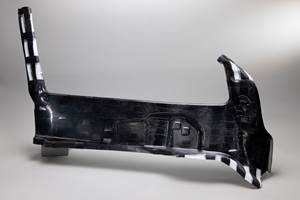High Tg epoxy resin is tailored for rotor performance needs
CAMX 2025: Flight-critical rotor blades, high-speed rotors or thermally demanding structural components can benefit from TCR Composites’ thermoset resin performance, properties and processing.
Share
TCR towpreg. Source | TCR Composites
TCR Composites (Ogden, Utah) highlights the release of its high glass transition temperature (Tg) resin, an epoxy resin system engineered to meet and exceed the demands of advanced rotor and aerospace applications. Developed with industry partners in mind, the resin has improved thermal performance, optimal mechanical properties and simplified processing.
With the rotor industry requiring high thermal and mechanical performance, TCR’s resin delivers a dry Tg exceeding 230°C (446°F), achieved with a simple out-of-autoclave (OOA) cure at just 177°C (350°F).
Extreme thermal performance. TCR’s Tg resin achieves a DMA storage modulus (E’) onset Tg > 45°C (81°F) and a Tan Delta peak Tg > 56°C (100°F) above its cure temperature, made possible by a 100% epoxy chemistry and ultra-high cross-link density formulation.
Room temperature storage. This resin offers a 3-month room temperature prepreg shelf life, with potential for longer durations as ongoing evaluations continue, simplifying logistics and reducing cold storage requirements.
Tailorable tack and flow. It maintains customizable handling characteristics, making it ideal for complex part geometries and hand layup operations.
High strength with flexibility. Demonstrates optimal tensile elongation and flexural strength, even when used with intermediate modulus fibers such as IM10 and T1100.
TCR Composites is a global thermoset resin systems company, known for providing high-performance prepreg materials tailored to the needs of aerospace, defense and industrial markets.
Related Content
-
Maximize your experience: CAMX 2025 exhibit previews, Part 1
This list of 90+ exhibitor previews solicited by CW offers a glimpse into the various technologies, emerging trends and solutions attendees should look for on the CAMX show floor.
-
Concentrated smooth dispersion simplifies electrical conductivity applications
CAMX 2024: Total Resin presents Total Nanotüp, a concentrated dispersion of carbon nanotubes in a bifunctional reactive monomer for polyester, vinyl ester, melamine and acrylic resins.
-
New brand identity launch aligns with nonwoven portfolio offerings
CAMX 2024: James Cropper, formerly known as Technical Fibre Products, is bringing its new name to the U.S. composites industry, highlighting its specialization in carrier, surface and fire protection veils, among other products.
Related Content
Maximize your experience: CAMX 2025 exhibit previews, Part 1
This list of 90+ exhibitor previews solicited by CW offers a glimpse into the various technologies, emerging trends and solutions attendees should look for on the CAMX show floor.
Read MoreConcentrated smooth dispersion simplifies electrical conductivity applications
CAMX 2024: Total Resin presents Total Nanotüp, a concentrated dispersion of carbon nanotubes in a bifunctional reactive monomer for polyester, vinyl ester, melamine and acrylic resins.
Read MoreNew brand identity launch aligns with nonwoven portfolio offerings
CAMX 2024: James Cropper, formerly known as Technical Fibre Products, is bringing its new name to the U.S. composites industry, highlighting its specialization in carrier, surface and fire protection veils, among other products.
Read MoreHighly tunable, woven lattice reinforcements target automotive structures
CAMX 2023: Startup Weav3D will be demonstrating its two collaborative automotive demonstrator parts and present two conference papers.
Read MoreRead Next
SHD Group presents MTE500 hot-melt resin
The solvent-free epoxy features a matured formulation, as well as processing and handling versatility.
Read MoreKaneka Aerospace announces epoxy-amine repair resin
Test results indicate that the two-part SR6400 resin achieves greater penetration into damaged areas of a composite and resorts laminate fracture toughness to the original state before damage.
Read MoreCeramic matrix composites: Faster, cheaper, higher temperature
New players proliferate, increasing CMC materials and manufacturing capacity, novel processes and automation to meet demand for higher part volumes and performance.
Read More









